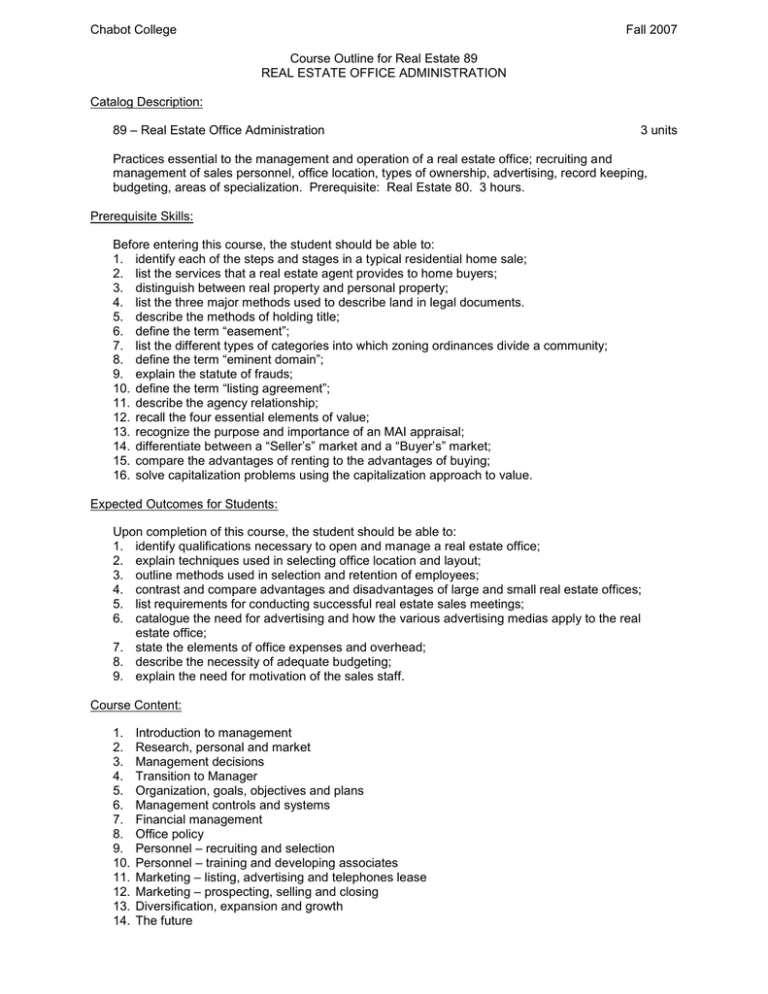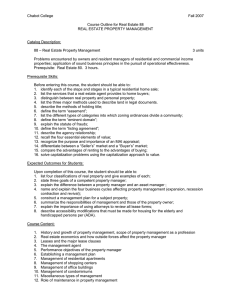Chabot College Fall 2007 Course Outline for Real Estate 89
advertisement

Chabot College Fall 2007 Course Outline for Real Estate 89 REAL ESTATE OFFICE ADMINISTRATION Catalog Description: 89 – Real Estate Office Administration 3 units Practices essential to the management and operation of a real estate office; recruiting and management of sales personnel, office location, types of ownership, advertising, record keeping, budgeting, areas of specialization. Prerequisite: Real Estate 80. 3 hours. Prerequisite Skills: Before entering this course, the student should be able to: 1. identify each of the steps and stages in a typical residential home sale; 2. list the services that a real estate agent provides to home buyers; 3. distinguish between real property and personal property; 4. list the three major methods used to describe land in legal documents. 5. describe the methods of holding title; 6. define the term “easement”; 7. list the different types of categories into which zoning ordinances divide a community; 8. define the term “eminent domain”; 9. explain the statute of frauds; 10. define the term “listing agreement”; 11. describe the agency relationship; 12. recall the four essential elements of value; 13. recognize the purpose and importance of an MAI appraisal; 14. differentiate between a “Seller’s” market and a “Buyer’s” market; 15. compare the advantages of renting to the advantages of buying; 16. solve capitalization problems using the capitalization approach to value. Expected Outcomes for Students: Upon completion of this course, the student should be able to: 1. identify qualifications necessary to open and manage a real estate office; 2. explain techniques used in selecting office location and layout; 3. outline methods used in selection and retention of employees; 4. contrast and compare advantages and disadvantages of large and small real estate offices; 5. list requirements for conducting successful real estate sales meetings; 6. catalogue the need for advertising and how the various advertising medias apply to the real estate office; 7. state the elements of office expenses and overhead; 8. describe the necessity of adequate budgeting; 9. explain the need for motivation of the sales staff. Course Content: 1. 2. 3. 4. 5. 6. 7. 8. 9. 10. 11. 12. 13. 14. Introduction to management Research, personal and market Management decisions Transition to Manager Organization, goals, objectives and plans Management controls and systems Financial management Office policy Personnel – recruiting and selection Personnel – training and developing associates Marketing – listing, advertising and telephones lease Marketing – prospecting, selling and closing Diversification, expansion and growth The future Chabot College Course Outline for Real Estate 89, Page 2 Fall 2007 Methods of Presentation: 1. Lecture 2. Discussion 3. Guest speakers Assignments and Methods of Evaluating Student Progress: 1. Typical Assignments a. Define the role an office administrator has in the real estate brokerage organization. How would this role impact a. ongoing operations b. future growth c. recruitment and retention of key employees. b. Visit two real estate brokerage companies and survey the office manager with regard to the key office administration and management issues discussed in Chapter 4 and in class. Summarize result of interview for submittal, and be prepared to share with class. c. Explain the role the internet and computers have taken in the last 5 years in the real estate office administration environment. In this research site two or more important web sites regularly accessed by real estate office administrators. 2. Methods of Evaluating Student Progress a. Examinations b. Assignments c. Final Examination Textbook(s) (Typical): Real Estate Office Administration, Dearborn Publishing, 2005 Special Student Materials: None JM/Sept2006 Revised 10/13/06, 11/3/06 RE89





